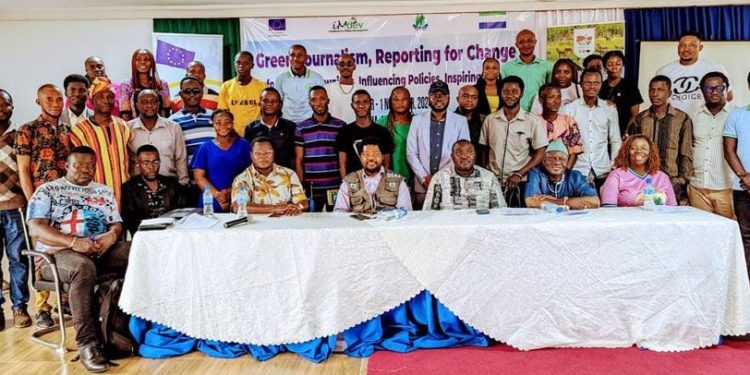The Sierra Leone Association of Journalists (SLAJ), in collaboration with the European Union Delegation in Sierra Leone, have today commenced a five-day green journalism training program in Kenema, running from October 28 to November 1, 2024. Funded by the European Union, the training is organized by the Initiatives for Media Development (IMdev), and brings together 22 journalists from across Sierra Leone and three social media influencers to build their capacity to effectively report on pressing environmental issues, including deforestation, coastal erosion, illegal fishing, and the broader impacts of climate change on Sierra Leone.
This program aims to elevate the role of journalists in shaping public discourse and influencing policies on environmental sustainability, climate change, and natural resource management. Participants will receive hands-on training in investigative reporting techniques, sustainable practices, and environmental governance.
The training will include field visits to two ecological sites: Tiwai Island Sanctuary and the Kambui Hills Forest Reserve. Tiwai Island, a renowned biodiversity hotspot, will offer participants firsthand insights into wildlife conservation and the importance of ecosystem preservation. The Kambui Hills Forest Reserve will highlight the challenges of deforestation and forest management, providing journalists with a deeper understanding of how these issues impact the environment and local communities.
Ahmed Sahid Nasralla, President of SLAJ, emphasized the importance of this initiative:
“The challenges Sierra Leone faces in environmental degradation require the media to step up and be the voice of both the environment and the people affected. This training provides the skills to turn complex environmental data into compelling narratives that inspire action and inform policy.”
Hon. Yema Mimi Sobba-Stephens, Deputy Minister of Environment and Climate Change, added:
“This initiative is a vital step in our national strategy to combat climate change and environmental degradation. By empowering journalists with the knowledge and skills to communicate these complex issues effectively, we are fostering a more informed public discourse and paving the way for evidence-based policymaking in environmental management.”
Ambassador Jacek Jankowski, EU Ambassador to Sierra Leone, commented:
“This training exemplifies the EU’s commitment to deepening our partnership with Sierra Leone in critical areas such as environmental sustainability and climate action. By empowering journalists to effectively report on these pressing issues, we are fostering a more informed public discourse and supporting Sierra Leone’s efforts to address climate change. This aligns with our shared dedication to sustainable development and creating opportunities for Sierra Leone’s youth to engage in meaningful dialogue about their country’s future.”
He affirmed the European Union’s commitment to supporting Sierra Leone’s efforts in protecting and preserving its biodiversity, citing the recent EU Beach Cleanup initiative among other actions aimed at supporting the country. A key focus of the Development Partnership and the Multiannual Indicative Programme for 2021-2027 is the Green Economy, which includes support for the sustainable management of Sierra Leone’s ecosystems and biodiversity.












